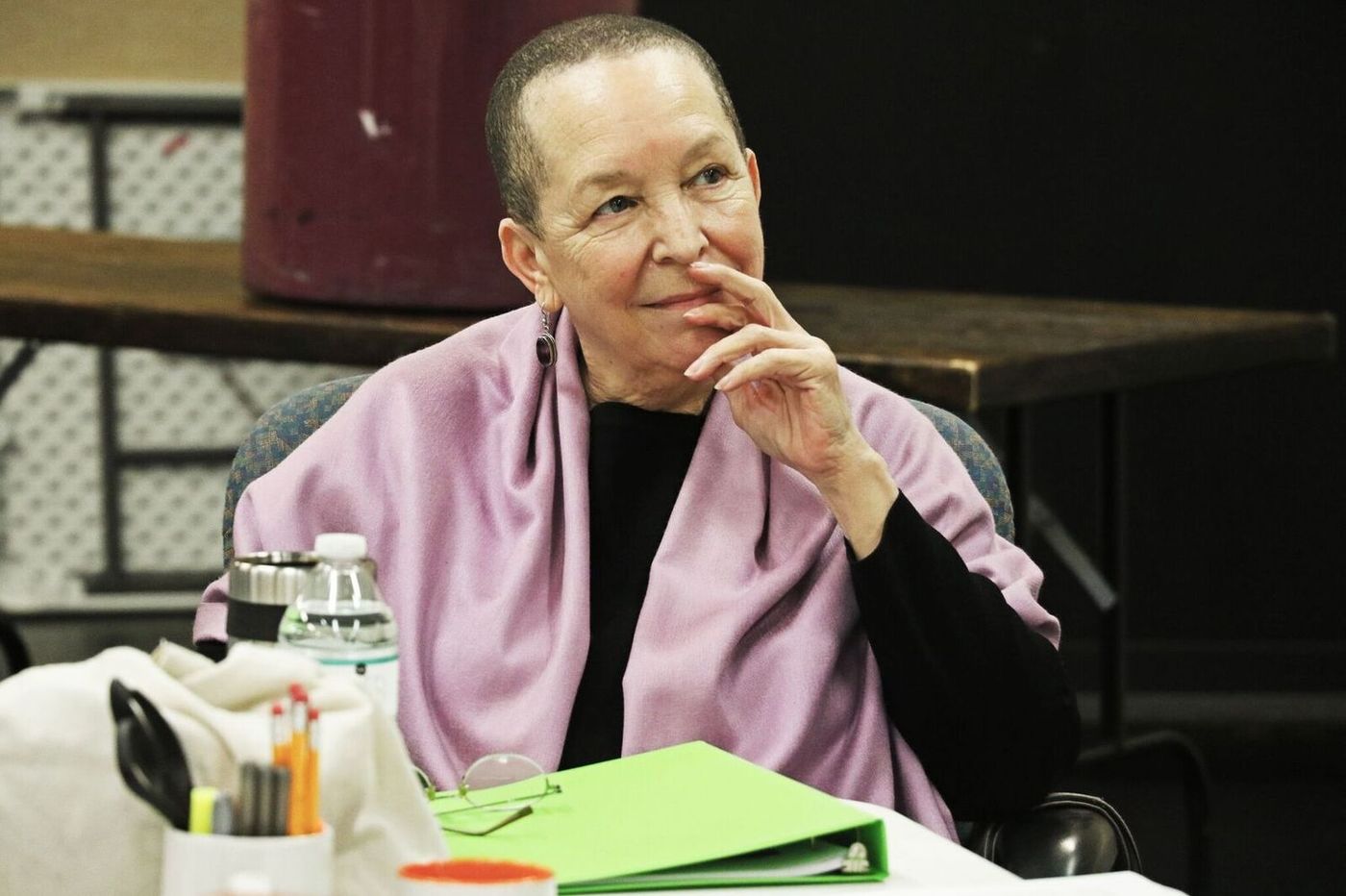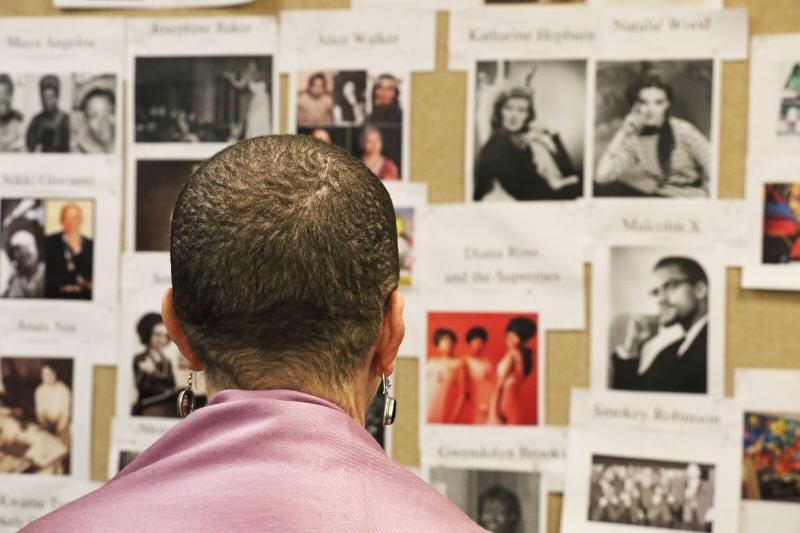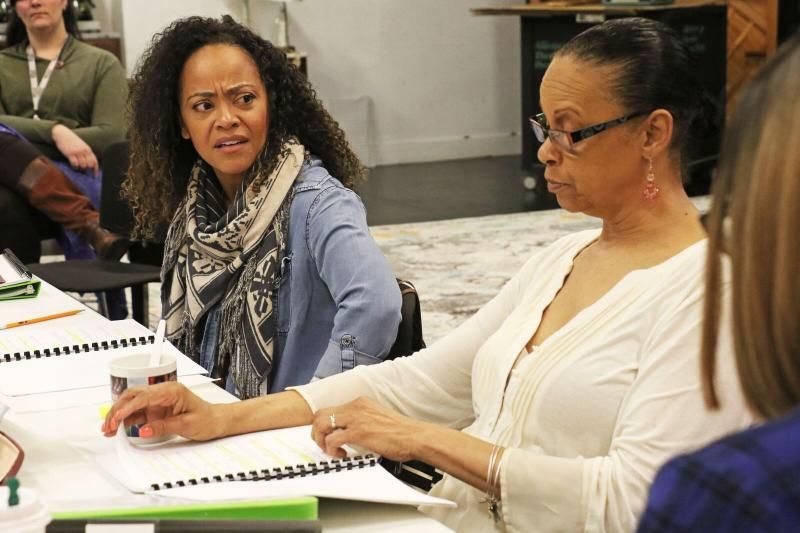Interview: Pearl Cleage of HOSPICE + POINTING AT THE MOON at Alliance Theatre

Hospice + Pointing at the Moon
Photo By A'riel Tinter
The ALLIANCE THEATRE is making another stop on the road, this time at the Fulton County Southwest Arts Center where they're presenting a pair of one-act plays, Hospice and Pointing at the Moon, both by celebrated playwright Pearl Cleage. BroadwayWorld caught up with Pearl Cleage to talk about her work.
You're offering up a pair of one-act plays for the ALLIANCE THEATRE's On the Road season. That's exciting.
Yes.
The first in the set is Hospice from 1983. Tell me what that play's about and what it's like to revisit an older work like that.
It's a mother and a daughter. The mother was a poet and left her daughter and her husband and left the United States when the daughter was 10 years old. The mother is Alice. The daughter is Minnie. And the mother left - went to Paris - and became a well-known poet and then becomes very ill, and so she comes home, actually, to die - knowing she's dying - and meets up with her daughter who happens to be living in the same house - she goes back to the grandmother's house - and the daughter is getting ready to have a baby, so neither of them can pick up and go somewhere else, so they're stuck there for two weeks together. And they're trying to make up for 20 years of silence between them because the mother had no contact with the daughter at all for 20 years. And the daughter is doing that thing that many of us do with our mothers which is pleading to her to tell you all the secrets about what it means to be a woman and how to make your way in the world and all that, and the mother keeps trying to say, "I don't have those secrets. I don't. You know, you're trying to make a fairy tale. This is not really real life. I don't know any secrets." So, the course of the play is them trying, actually, to find a moment to meet and realize that they do have affection for each other and that they know they're not going to see each other again. At the end of the play, the daughter goes off to have her baby and the mother is at home, and we know the mother is not going to be there when she gets back. So, it's kind of sad, of course, because there's the death, but it's also looking at that dance that mothers and daughters do where you are trying to understand your mother and you see yourself in your mother and you want to know what that means and where that's going. When I read the play, again, last year, I actually was struck by the fact that the daughter is 30 years old when the play ends, and I really was curious about what had happened to her, what kind of woman did she become, how much of her mother was in her, what did she become as a woman. Because of this, I actually took the character forward 30 years, so when we see her in the first play, she's 30, and when we catch up with her in the second play, she's 60.

Hospice + Pointing at the Moon
Photo By A'riel Tinter
And that second play is Pointing at the Moon.
Pointing at the Moon. Right.
And this is its world premiere, right?
Yes. Pointing at the Moon is brand new. It's catching up with that same daughter, but both plays have the same amazing, wonderful actors. The second one has the daughter from the first play and then a friend of hers who is about 45 years old who doesn't appear in the first play.
And why do you think this character spoke to you again like that? I find, as a writer myself, that that rarely happens to me.
And I've never done that before, but I felt like when I read it I understood the mother much better than I did when I wrote it. When I wrote it, I was much younger, of course, so that I was really much more in the moment - my mother died fairly young - and I was in that moment that the daughter is in, trying to say, "Wait. There's more. I need to know more. You know... You can't leave me. You have to explain the world to me." So, I was kind of grappling with understanding my own mother and father when I wrote that play. When I read it again - Hospice - I felt that I had a much better grasp of what it meant to be the mother because some of the questions she was asking about mortality and the choices that she had made are the choices that you make now as opposed to the choices I was looking at when I was younger and writing the play, much more curious about the questions that the daughter was raising, so that's why I wanted to see if I could kind of bring her forward and see what kind of woman did she grow up to be.
Yeah. That's really interesting. What are the challenges of working with this short form?
Well, the challenge is you have to get to the point a lot faster. You know, you have to say what you have to say because you don't have a whole Act One and then an intermission and then an Act Two, but the thing that allowed me to cheat a little bit is that I've got the one character who goes through so that it's kind of following an arc of a person as opposed to - this is the same story. But it's, you know, here's this woman at age 30, then we have an intermission, then we catch up with her again at age 60, and it's a very different story. Yeah, so it didn't have to be two separate stories. They're kind of under the same umbrella.
That makes so much sense. Now, you've had a long relationship with the ALLIANCE THEATRE, right?
Mm-hmm. Yep.
What have you found to be really fruitful about that relationship?
My first actual association with them was when Kenny Leon was the artistic director, and he was a person I had known before he became the artistic director at the Alliance, so we were good friends. And when he got there, he told me that he had money to commission plays, and he wanted to know if I would like to be commissioned to write a play for the Alliance, and as a working playwright, I said, "Absolutely." So that ended up...that was Flyin' West, the first play that I wrote for them. So, I did Flyin' West there. I did Blues for an Alabama Sky, and I did another play called Bourbon at the Border. So, Kenny commissioned three plays from me and, you know, it was really a wonderful relationship. He's still a good friend of mine, but my relationship was more, at that point, with him and not so much with the theatre. I came in, you know, as a playwright will do, for the rehearsals of my own play, I was there during the time of my play, and then I left. When I came back again, having been invited by Susan Booth, who is now our artistic director, I had written a play that was set in Montgomery in 1963 at the height of the Civil Rights Movement, and it was commissioned by the Alabama Shakespeare Festival, and they were going to premiere it, so I sent the play to Susan, and I didn't have a relationship with her then. I had met her, but we didn't really know each other. And I had sent her a copy of the script and said, you know, that it was going to be done in Alabama, and I hoped that she would consider producing it after they had done it. And she sent me back a note and said, "I really love the play, and if you don't have a director, I would really love for you to think about me directing it." So, I said, "Well, okay. Let's see how that works." So, we had to go. They wouldn't let us move the premiere to Atlanta. She tried to get them to let us move it here, and they were like "No, we commissioned it. It's going to be in Alabama." So we all went to Montgomery for a month, and we spent a month there living together in the same apartment complex and, you know, doing the rehearsals, and we really got to know each other which was lovely. And the play did really well in Alabama, so we brought the same cast and everything up the road to Atlanta, and they did it at the Alliance, and it did wonderfully. It was a really great experience working with Susan. I really love her work as a director, and we got along really well, so she said to me, "I really want to keep you involved with this theatre, so why don't we create a position for you called Artist in Dialogue"- because I've been living in Atlanta for a very long time, and I've been very involved in many things that go on here, so she said, "How about if we call it Artist in Dialogue, and then you can just continue doing whatever you do, but it would be great for us to have your voice and your input here as a part of our theatre. So, I said, "That sounds wonderful." I did that for a couple years and then we received a grant from the Mellon Foundation. They have a wonderful program where they picked 14 playwrights for their first round - 14 playwrights where they would embed you in a theatre - you had to apply with the theatre - and then you would become the Playwright in Residence at that theatre for three years, and then if it went well, you could do it again for another three years. And then after that, you and the theatre work out whether or not you want to stay on or if it's done. So, I have been, for the last five years, the Mellon Playwright in Residence at the Alliance. I have one more year on that grant and then, you know, I told them I'm not going anywhere, so I'll stay there. But, it's been really wonderful because it gave me a home base, which is really wonderful.

in Rehearsal for Hospice + Pointing at the Moon
Photo by A'riel Tinter
A lot of playwrights certainly do not have that luxury.
We're gypsies, you know. It's a home base. It's health insurance. It's getting to work with the same group of collaborators, the same group of designers, the same people. So, it was really wonderful for me. I also think it was a good time for them because Susan was really - and still is - very conscious of the theatre being an institution that has a good national reputation but is deeply rooted in the community that is Atlanta, and I feel the same about my own work. I know I have a national presence, but I also am very much a part of this community, and I want to write stories that resonate with this community. Our goals were kind of the same. And then the idea of taking a theatre like this and really being able to work with her and the other senior staff there to say, "Okay. What do we mean when we say that we want this theatre to reflect Atlanta, when we say we want this theatre to be diverse in a way that isn't just lip-service but is really something that reflects the very diversity that we see all around us in Atlanta?" So, it's been really wonderful for me to be a part of that effort moving forward.
I've heard that you are going to present a work for the inaugural season of the new theatre. Is that true?
Yes.
Any hints about what that one's going to be about?
I can't really talk about it. I can tell you what the title is.
Oh, darn it.
Oh, I can tell you just a little bit about it. It's about six women characters, and they're dealing with the moment in our national life where women are more and more being involved as candidates for office - running for office - and these are six very different women, but they come together to kind of look at - several of them are interested in running for office - one of them is kind of an expert consultant who has done it before, two of them are older and they have been doing old-style politics for a long time, and then there's one who's kind of the wild card who is actually not interested in politics and is just kind of there for another reason, but she becomes a part of that moment. And they're trying to look at what does it mean when we say, "This is great. We're going to have women in politics." What women are you talking about? How can you define a group of people based only on gender or only on race? You really can't. You know, you have to look specifically at which women are we talking about. What women is this? What person is this? And that's kind of what the play makes you look at, saying, "Now we're going to do women for a while." You know, that doesn't really mean anything because that's such a wide swath of people. It's like trying to say, "No, we have to be specific when we say we want people to do this or people to do that." You can't really define people by their race or gender because it never works out. So, the name of the play is Angry, Raucous, and Shamelessly Gorgeous.
That sounds great. How exciting! I'm looking forward to seeing it and to seeing this upcoming show. Thank you so much for your time today. It was such a joy to speak with you.
Thank you. I appreciate it.
Hospice and Pointing at the Moon run through April 15.
For tickets and info, visit www.alliancetheatre.org
Videos

